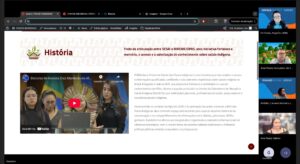In the month that celebrates the Indigenous Peoples’ International Day, BIREME/PAHO/WHO, in cooperation with the Especial Secretariat of Indigenous Health (SESAI/MS), continues the actions of the 93rd Technical Cooperation Agreement (TC93). The agreement seeks to promote the strengthening of information and knowledge management on indigenous health, with an emphasis on increasing transparency and disseminating scientific and technical content aimed at the native peoples of Brazil. This cooperation has established itself as a strategic milestone, supporting public policies, care practices, and research initiatives that directly impact the health of indigenous communities in Brazil.

Among the main expected results is the creation of the Virtual Health Library for Indigenous Peoples, a thematic instance of the VHL Model, currently under development, whose purpose is to gather, organize, and disseminate qualified information on indigenous health, including scientific and technical documents, reports, institutional publications, and reference materials related to the Indigenous Health Care Subsystem (SasiSUS). There are also plans to make Knowledge Showcases available for the easy dissemination of information on priority topics, and a SasiSUS Timeline, which will present milestones and historical moments of the Subsystem, contributing to the preservation of institutional memory and access to knowledge.
Among the advances already achieved, the indexing of strategic content selected and organized according to criteria of bibliographic governance and information management stands out. “This process included the analysis and systematization of reports, technical publications, and other documents produced in the field of indigenous health, ensuring their future availability in a standardized and easily accessible format,” highlights librarian Angélica de Paula, focal point of the project at BIREME. In addition, the initiative was designed to meet the needs of health teams working in the 34 Special Indigenous Health Districts (DSEI), who face the daily challenge of having up-to-date and reliable information to support their health care and management actions with indigenous communities.
The project also includes the organization of thematic collections, the construction of digital decision support resources, and the integration of different types of information sources, in order to consolidate the Indigenous Peoples VHL as a structured and reliable repository. In addition to systematizing the collection, collaborative processes are expected to be adopted to ensure the continuous updating of the portal and encourage the use of information by its different audiences. The official launch is scheduled for October 2025, when the VHL Portal and its collection of information sources, such as showcases, timelines, and the Memória SasiSUS database, will be publicly presented as reference spaces for the dissemination and use of information on indigenous health.
SESAI, through the General Coordination of Knowledge, Information, Evaluation, and Monitoring of Indigenous Health (CGCOIM), emphasized the importance of the partnership with BIREME, highlighting that this initiative strengthens access to qualified information on indigenous health. “For SESAI/CGCOIM, the creation of the Virtual Health Library of Indigenous Peoples is a historic milestone in the appreciation of traditional knowledge and the promotion of more effective and culturally sensitive public policies. Having its own Virtual Library represents for SESAI not only a space for memory and institutional record keeping, but also a platform that allows society to access the history and diversity of indigenous peoples. This collective action is considered strategic for increasing the visibility of health practices in indigenous territories and for consolidating the institutional memory of SESAI,” said Maial Paiakan Kaiapó, Coordinator of CGCOIM.
With this cooperation, SESAI and BIREME/PAHO/WHO reaffirm their commitment to contributing to health equity and expanding access to quality information, recognizing and valuing the cultural diversity and specificities of indigenous peoples in Brazil. The Indigenous Peoples VHL represents an important step toward giving greater visibility to the actions and strategies of SasiSUS, strengthening information as a fundamental input for decision-making, knowledge production, and guaranteeing the right to health for these populations.